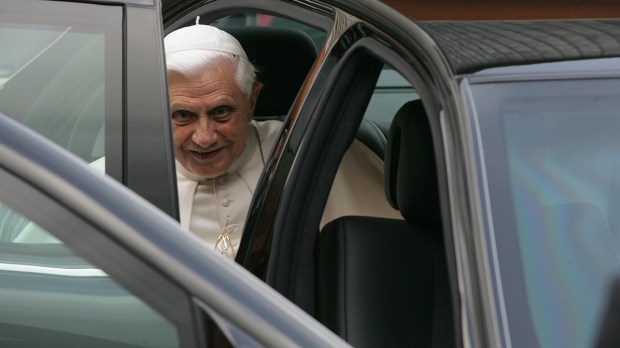Ashes.
His thumb was dipped in ashes. The burnt remains of palm fronds from the previous year’s Palm Sunday clung to his skin. And as his gently trembling thumb scrawled a cross on the forehead of the Dominican priest before him, one could almost imagine hearing,
“Memento, homo … quia pulvis es, et in pulverem reverteris.“
“Remember, man … that you are dust, and to dust you shall return.”
Four short years ago, on Ash Wednesday, Pope Benedict XVI celebrated the last Mass of his papacy. Draped in richly colored purple vestments, his face furrowed with deep lines and his ivory miter resting gingerly upon his shock of white hair, the pope smiled. His love of the unfolding liturgy – the mourning of man’s tragic fall and the joy of God’s ineffable grace — had only grown with time. To celebrate one’s last Mass in ashes simply seemed right.
And his message from the ashes was clear: We are to return to the Lord.
The aged pope surely understood the nature of our original and continued separation. He had considered it all of his priesthood and his life. Though God created us, our ancestors sinned and separated themselves from our Father. Their error was our inheritance. Ever since, our headstrong ways have stubbornly ushered us from the virtue and sanctity of our Father’s embrace into the barren lands of pride and selfishness. From the glorious waving of palms to the bitterness of ashes.
We are to return to the Lord.
And so, in his final homily as pope, Benedict XVI would say this (excerpted):
The prophet [Joel] says: “return to the Lord, your God, for he is gracious and merciful, slow to anger, abounding in steadfast love, and relenting in punishment” (v. 13). It is possible to return to the Lord, it is a ‘grace,’ because it is the work of God and the fruit of faith that we entrust to His mercy. But this return to God becomes a reality in our lives only when the grace of God penetrates and moves our innermost core, gifting us the power that “rends the heart.” Once again the prophet proclaims these words from God: “Rend your hearts and not your garments” (v. 13). Today, in fact, many are ready to “rend their garments” over scandals and injustices – which are of course caused by others — but few seem willing to act according to their own “heart,” their own conscience and their own intentions, by allowing the Lord transform, renew and convert them …
The prophet [Joel] focuses on the prayers of priests, who, with tears in their eyes, turn to God, saying: “Between the porch and the altar let the priests weep, let the ministers of the LORD weep and say: ‘Spare your people, Lord! Do not let your heritage become a disgrace, a byword among the nations! Why should they say among the peoples, “Where is their God?”‘” (V.17). This prayer leads us to reflect on the importance of witnessing to faith and Christian life, for each of us and our community, so that we can reveal the face of the Church and how this face is, at times, disfigured. I am thinking in particular of the sins against the unity of the Church, of the divisions in the body of the Church. Living Lent in a more intense and evident ecclesial communion, overcoming individualism and rivalry is a humble and precious sign for those who have distanced themselves from the faith or who are indifferent …
In God’s immersion in human suffering and the abyss of evil is the root of our justification. The “return to God with all your heart” in our Lenten journey passes through the Cross, in following Christ on the road to Calvary, to the total gift of self. It is a journey on which each and every day we learn to leave behind our selfishness and our being closed in on ourselves, to make room for God who opens and transforms our hearts …
[Prayer, fasting and almsgiving] are also traditional indications on the Lenten journey to respond to the invitation to “return to God with all your heart.” But he points out that both the quality and the truth of our relationship with God is what qualifies the authenticity of every religious act. For this reason he denounces religious hypocrisy, a behavior that seeks applause and approval. The true disciple does not serve himself or the “public,” but his Lord, in simplicity and generosity: “And your Father who sees everything in secret will reward you” (Mt 6,4.6.18). Our fitness will always be more effective the less we seek our own glory and the more we are aware that the reward of the righteous is God Himself, to be united to Him, here, on a journey of faith, and at the end of life, in the peace light of coming face to face with Him forever.
Dear brothers and sisters, we begin our Lenten journey with trust and joy. May the invitation to conversion , to “return to God with all our heart,” resonate strongly in us, accepting His grace that makes us new men and women, with the surprising news that is participating in the very life of Jesus. May none of us, therefore, be deaf to this appeal …
As Pope Benedict XVI stood silently before the throngs gathered in St. Peter’s Basilica, even though he was worn by age and frailty, it became clear. His life and papacy clearly grappled with the tragically ephemeral nature of man’s earthly existence, the gritty ashes of our fallen state. But he also embraced the eternal bliss that awaits us in heaven. A heaven that transcends the ashes.
We are dust and to dust we shall return.
Indeed.
But let us return to the Lord.
May God watch over you, Holy Father.
To read Pope Benedict XVI’s final papal homily in full, please link here.

